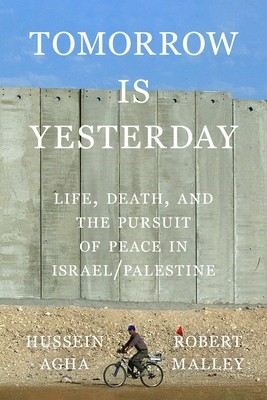
- We will send in 10–14 business days.
- Author: Hussein Agha
- Publisher: Farrar, Straus and Giroux
- ISBN-10: 0374617120
- ISBN-13: 9780374617127
- Format: 16.5 x 23.6 x 2.8 cm, kieti viršeliai
- Language: English
- SAVE -10% with code: EXTRA
Reviews
Description
Two insiders explain why the Israeli-Palestinian peace process failed, and anticipate what lies ahead.
On October 7, 2023, Hamas fighters killed more than eleven hundred Israelis and took more than two hundred hostages, prompting an Israeli response that has in turn taken tens of thousands of lives and devastated the Gaza Strip. The conflict upended the region and the world. Why did this happen, and can anything be done to grant peace and justice to Israelis and Palestinians alike? In Tomorrow Is Yesterday, the analyst Hussein Agha and the diplomat Robert Malley offer a personal and bracing perspective on how the hopes of the Oslo Peace Process became the horrors of the present. Drawing on their experience advising the Palestinian leadership (Arafat and Abbas) and US presidents (Clinton, Obama, and Biden) and their participation in secret talks over decades, Agha and Malley offer candid portraits of leading figures and an interpretation of the conflict that exposes the delusions and lies of all sides. They stress that the two-state solution became a global goal only when it was no longer viable; that Hamas's onslaught and Israel's war of destruction were not one-offs or historical exceptions but historical reenactments; and that the gaps separating Israelis and Palestinians have less to do with territorial allocation than with history and emotions. They show how US officials preferred technical schemes and linguistic formulations to a frank reckoning with the past. In incisive prose and revelatory anecdotes, Agha and Malley lay bare the inner workings of a peace-processing industry that failed to achieve its goals because it created an alternative, inauthentic reality and substituted it for what truly mattered to and moved Israelis and Palestinians. Throughout, they illustrate how there is no better guide to what lies in store tomorrow than what happened yesterday.EXTRA 10 % discount with code: EXTRA
The promotion ends in 24d.01:44:46
The discount code is valid when purchasing from 10 €. Discounts do not stack.
- Author: Hussein Agha
- Publisher: Farrar, Straus and Giroux
- ISBN-10: 0374617120
- ISBN-13: 9780374617127
- Format: 16.5 x 23.6 x 2.8 cm, kieti viršeliai
- Language: English English
Two insiders explain why the Israeli-Palestinian peace process failed, and anticipate what lies ahead.
On October 7, 2023, Hamas fighters killed more than eleven hundred Israelis and took more than two hundred hostages, prompting an Israeli response that has in turn taken tens of thousands of lives and devastated the Gaza Strip. The conflict upended the region and the world. Why did this happen, and can anything be done to grant peace and justice to Israelis and Palestinians alike? In Tomorrow Is Yesterday, the analyst Hussein Agha and the diplomat Robert Malley offer a personal and bracing perspective on how the hopes of the Oslo Peace Process became the horrors of the present. Drawing on their experience advising the Palestinian leadership (Arafat and Abbas) and US presidents (Clinton, Obama, and Biden) and their participation in secret talks over decades, Agha and Malley offer candid portraits of leading figures and an interpretation of the conflict that exposes the delusions and lies of all sides. They stress that the two-state solution became a global goal only when it was no longer viable; that Hamas's onslaught and Israel's war of destruction were not one-offs or historical exceptions but historical reenactments; and that the gaps separating Israelis and Palestinians have less to do with territorial allocation than with history and emotions. They show how US officials preferred technical schemes and linguistic formulations to a frank reckoning with the past. In incisive prose and revelatory anecdotes, Agha and Malley lay bare the inner workings of a peace-processing industry that failed to achieve its goals because it created an alternative, inauthentic reality and substituted it for what truly mattered to and moved Israelis and Palestinians. Throughout, they illustrate how there is no better guide to what lies in store tomorrow than what happened yesterday.

Reviews